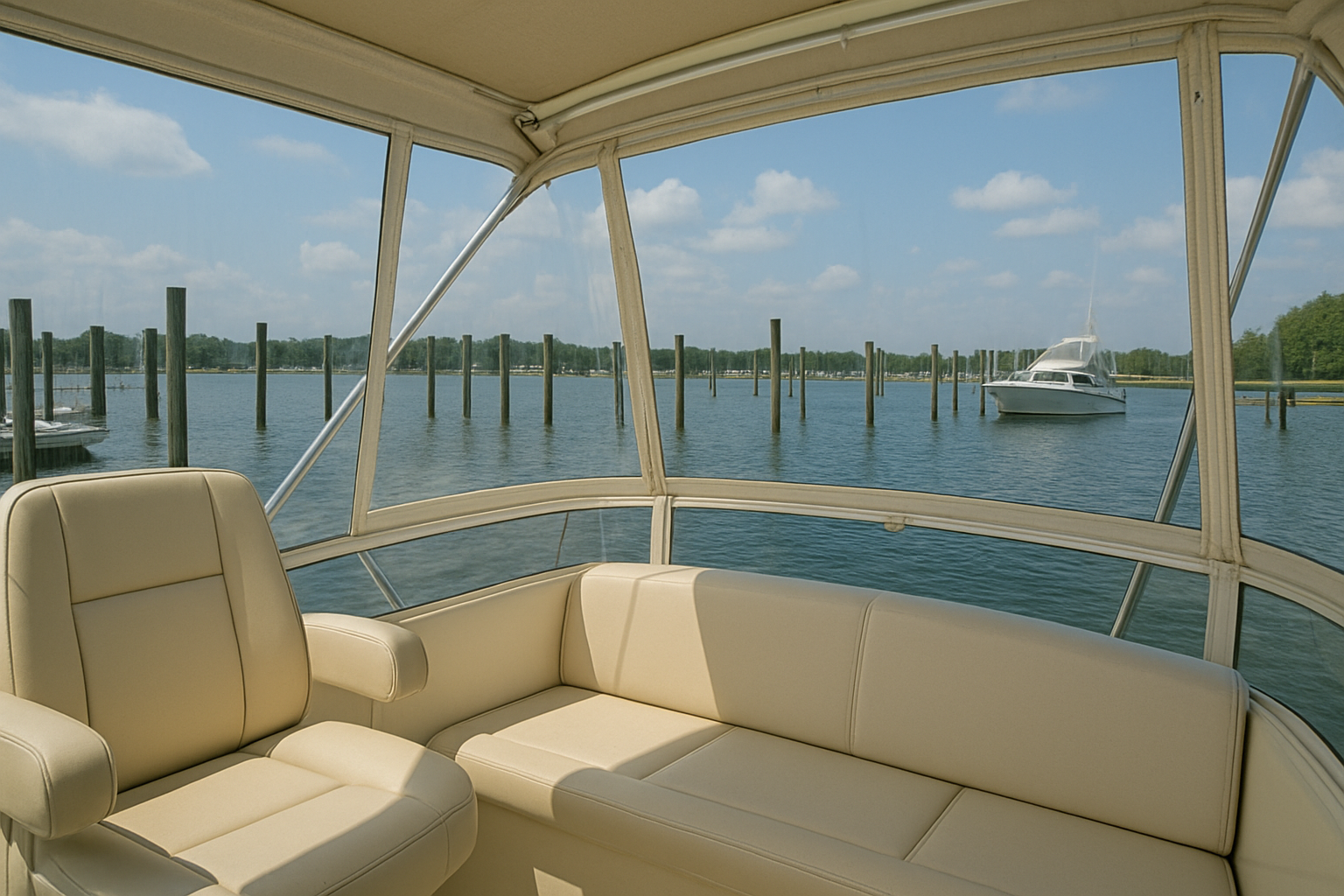
Bringing the Light In: Using Clear Vinyl for Enhanced Visibility on Your Boat
Clear visibility stands as a crucial factor for safe boating. Many boat owners face challenges with poor visibility during rough weather or low-light conditions. The right clear vinyl windows can make a huge difference in both safety and comfort while out on the water.
Marine environments put extreme stress on boat materials. High-quality vinyl offers excellent protection against UV rays and harsh weather elements. Clear vinyl windows provide crystal clear views of the surroundings.
These windows also resist damage from UV rays, saltwater exposure and provide long-lasting durability in tough conditions.
The perfect clear vinyl solution exists for every boat owner's needs. This guide explores different types of clear vinyl, their benefits, and essential maintenance tips. Boat owners will learn how to choose the right thickness, assess UV protection features, and keep their vinyl windows in top shape.
Ready to transform your boat's visibility?
Key Takeaways
-
Marine-grade clear vinyl comes in 4 to 80-gauge thickness, with 30-80 gauge best for standard boat windows. UV-resistant vinyl can last up to 10 years with proper care and maintenance.
-
Two main types exist: flexible pressed sheets and roll vinyl. Each offers different protection levels against sun, salt, and storms. Factory-coated options like Flexa Pro+ provide the best UV protection with the longest life expectancy.
-
Clean vinyl with a 10% vinegar-water solution and avoid harsh chemicals like Simple Green. Warm soapy water (mild dish soap) is the best starter. Never use pine-based cleaners or sandpaper on clear vinyl surfaces.
-
UV-resistant marine vinyl needs special covers between uses to prevent damage. Soft canvas covers protect vinyl windows without causing surface contact damage. Regular cleaning with non-abrasive sprays keeps windows crystal clear.
-
Clear vinyl thickness affects its strength and flexibility during installation. Higher gauge numbers mean thicker vinyl and better protection. The material resists harmful damaging UV rays while maintaining visibility in rough weather.
What is Clear Vinyl Used for on Boats?
Boat owners need reliable materials to protect their vessels while maintaining visibility. Marine-grade clear vinyl serves as a vital component for boat windows and enclosures. This durable material creates a protective barrier against water, wind, and harsh weather conditions while offering crystal-clear views.
The primary function of clear vinyl extends beyond basic window coverage. UV-resistant marine vinyl, available in 4 to 80 gauge thickness, shields itself from harmful damaging sun rays.
The material acts as an insulator, reducing energy costs and preventing moisture buildup inside the boat. Many boaters install flexible clear vinyl sheets on their vessel's sides, front panels, and top sections to create a comfortable, protected space without sacrificing visibility or aesthetic appeal.
Benefits of Using Clear Vinyl for Boat Visibility
Clear vinyl creates a protective shield around boats while offering unmatched visibility in rough seas and storms. The material stands as a vital upgrade for boat owners who need both safety and comfort during their marine adventures.
Enhanced visibility in all weather conditions
Marine-grade clear vinyl offers excellent visibility through boat enclosures in harsh weather conditions. UV-resistant vinyl panels maintain crystal-clear views during heavy rain, strong winds, and rough seas.
Star brite View Guard creates a water-sheeting effect that improves visibility during storms, making navigation safer for recreational boaters. The treated panels stay clear for extended periods, even in high humidity environments.
Coated vinyl products perform better than uncoated options in challenging marine conditions. These specialized materials resist harmful UV rays while maintaining optical clarity through the panels.
High-quality vinyl sheets resist hazing and discoloration, providing reliable visibility for critical navigation tasks. The next section explores how UV protection features enhance the durability of clear vinyl materials.
Protection against UV rays and harsh elements
Clear vinyl shields boats from harsh UV rays and extreme weather conditions. Factory-coated materials like Flexa Pro+ offer superior protection against sunlight damage and moisture buildup.
Protective flaps placed over clear vinyl panels extend their life by blocking direct UV exposure. The right cleaner/protectants create a barrier against dirt and moisture, which helps maintain the vinyl's clarity.
UV-resistant marine vinyl stands strong against saltwater, sun, and storms for up to 10 years before showing signs of wear. High-quality vinyl with UV protection features prevents early cracking and fading common in uncoated materials.
Proper maintenance with specialized spray cleaners keeps the vinyl crystal clear while fighting off humidity hazing and discoloration. The combination of UV-resistant properties and regular care ensures maximum durability in challenging marine environments.
Durable and long-lasting material
Marine-grade clear vinyl stands as one of the most durable materials for boat windows and enclosures. This high-quality vinyl resists yellowing, clouding, and scratching while maintaining crystal clear visibility through various weather conditions.
The material's thickness ranges from 4-gauge to 80-gauge, offering options for different marine applications and stress levels.
UV-resistant clear vinyl panels prove their worth in saltwater environments with superior strength and longevity. The flexible material withstands constant exposure to sun, spray, and harsh marine elements without breaking down or losing transparency.
Professional boat owners choose coated vinyl sheets for their ability to maintain structural integrity across temperature changes and humidity levels while providing excellent visibility for safe navigation.
Types of Clear Vinyl for Boats
Boat owners can choose from three main clear vinyl types that offer different levels of durability and UV protection for their marine needs - read on to learn more about each option and find the perfect match for your vessel.
Flexible clear vinyl sheets
Flexible clear vinyl sheets offer superior visibility and protection for marine environments. These sheets range from 30-gauge to 80-gauge thickness, meeting various durability needs.
Marine-grade vinyl sheets from trusted brands like Flexa provide crystal clear views while resisting harmful UV rays. The flexible nature allows easy installation around curved surfaces and complex boat structures.
The material's adaptability makes it perfect for DIY boat enclosures and window replacements. Clear vinyl resists saltwater damage and maintains clarity through harsh weather conditions.
Users can cut these sheets with a vinyl cutter for custom fits on any boat surface. The material pairs well with LED lights and navigation systems, enhancing visibility during nighttime operations.
Clear Roll vinyl
UV-resistant clear vinyl stands as a vital shield against harsh marine elements. Marine-grade clear vinyl features special UV inhibitors that block harmful sun rays from damaging boat interiors.
The 40-gauge thickness provides optimal durability while maintaining crystal-clear visibility through windows and enclosures.
High-quality UV-resistant vinyl prevents yellowing and hazing common in marine environments. The 54-inch wide material offers excellent protection from saltwater spray while resisting humidity damage.
Clear Marine Vinyl maintains its transparency through extended sun exposure, making it ideal for businesses and DIY boat owners seeking long-term window solutions.
Tips for Choosing the Right Clear Vinyl
Boat owners need specific knowledge to select the right clear vinyl for their vessels. Marine experts recommend checking three vital factors: gauge thickness, UV protection ratings, and salt water resistance levels.
Consider the gauge thickness
Clear vinyl thickness plays a vital role in marine applications. Marine-grade clear vinyl comes in various gauges, ranging from 4 to 80, with each gauge serving specific purposes. The 30 to 40 gauge options work best for standard boat windows, offering good visibility and durability.
Heavier-duty applications need 60-80 gauge vinyl to withstand harsh marine conditions.
Professional installers recommend 30-gauge or thicker clear vinyl for maximum protection in porch enclosures and high-traffic areas. The thickness directly affects overall durability of the material.
Higher gauge numbers mean thicker vinyl, which provides better protection against saltwater spray and strong winds. The material's gauge also impacts its flexibility and installation requirements for different boat sections.
Look for UV protection features
UV protection stands as a vital feature in marine-grade clear vinyl. Factory-coated materials such as Flexa Roll vinyl and Flexa Pro+ offer superior defense against harmful UV rays and humid conditions.
These specialized coatings shield the vinyl from sun damage while maintaining crystal-clear visibility through windows and panels.
High-quality vinyl with UV-resistant properties prevents yellowing and extends the material's lifespan in harsh marine environments.
Marine professionals recommend coated vinyl options for their proven performance against both UV exposure and saltwater conditions.
Assess durability for marine environments
Marine environments demand tough materials that resist salt, sun, and storms. Clear vinyl must endure harsh saltwater conditions while maintaining its crystal-clear visibility. The material's gauge thickness plays a vital role in its strength, with options ranging from 4-gauge to 80-gauge vinyl sheets.
High-quality vinyl with UV resistance stands up better to constant sun exposure and prevents yellowing or cracking.
The right marine-grade clear vinyl fights off humidity hazing and maintains clarity through extreme weather. Coated vinyl offers extra protection against scratches and chemical damage from saltwater spray.
The material's durability directly affects its lifespan and performance in rough seas. Boat owners need vinyl that resists tears, punctures, and impact damage while keeping its flexible properties intact.
Maintenance and Care for Clear Vinyl on Boats
Regular cleaning with marine-grade vinyl cleaners keeps clear vinyl windows crystal clear and free from haze. Boat owners must protect their clear vinyl from harsh elements through proper storage and UV-resistant covers during extended periods of non-use.
Cleaning techniques for clarity and longevity
Proper cleaning methods protect clear vinyl windows and extend their lifespan on boats. A 10-percent solution of vinegar and water serves as an effective cleaner for most clear vinyl surfaces.
Boat owners must hand wash these windows to remove harmful substances like sunscreen and DEET-based insect repellents. The cleaning process requires gentle wiping motions with a soft cloth to maintain the vinyl's clarity.
Marine professionals recommend specific products for different vinyl types to preserve warranties. Simple Green and pine-based cleaners damage clear vinyl surfaces and create a dull appearance.
UV-resistant marine vinyl needs thorough rinsing after cleaning, followed by a protective coating application. This coating shields the material from harsh saltwater exposure and intense sunlight, which helps maintain crystal clear visibility through the windows.
Protection against scratches and discoloration
Clear vinyl protection requires specific care methods to prevent damage. Marine-grade covers shield vinyl windows from UV rays and physical wear that cause scratches. Premium coated products like Flexa Pro+ offer superior resistance to scratching compared to standard uncoated options.
Low-profile covers create a protective barrier without direct contact with the vinyl surface.
Regular maintenance stops discoloration and extends vinyl clarity for up to 10 years. Gentle cleaning with non-abrasive spray cleaners maintains the crystal clear appearance. UV-resistant marine vinyl needs protection from harsh buffing or sandpaper, which can permanently damage the surface.
Proper storage under protective covers between uses blocks harmful UV exposure that leads to yellowing and cracking over time.
Conclusion
Clear vinyl stands as an essential upgrade for boat owners who value safety and comfort on the water. The right vinyl choice creates perfect visibility while protecting passengers from harsh weather and UV rays.
Smart maintenance habits keep these protective barriers crystal clear for years of reliable service. Proper installation of marine-grade vinyl delivers both practical benefits and enhanced aesthetics that make boating more enjoyable in any weather condition.
FAQs
Q: How do I maintain clear vinyl windows on my boat for better visibility?
Clean your high-quality vinyl windows with specialized spray cleaners, not creams or pastes. Regular maintenance prevents hazy spots and humidity hazing in marine environments.
Q: What makes clear plastic windows become cloudy?
UV exposure and saltwater contact cause vinyl windows to turn hazy. The combination of sunlight and marine conditions or mineral buildup speeds up this process.
Q: What lighting options work best with clear vinyl windows?
LED bulbs provide superior visibility compared to incandescent lights. These running lights offer better spectrum coverage and use less power from your alternator.
Q: How can I test my boat's vinyl windows for clarity at night?
Use a flashlight to check for dark spots or haziness after sunset. The naked eye can spot problem areas better with white light against the clear vinyl.
Q: Does UV protection matter for boat windows?
UV-protected coated vinyl lasts longer than uncoated vinyl and stays crystal clear. Using covers offers extra protection during storage and non-use.


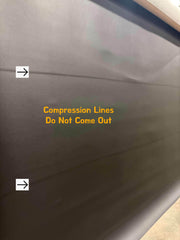
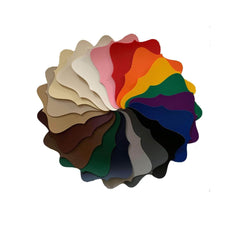
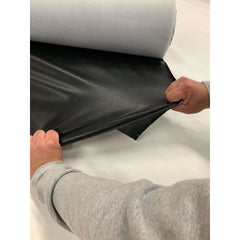
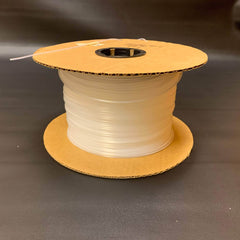


Leave a comment
This site is protected by hCaptcha and the hCaptcha Privacy Policy and Terms of Service apply.